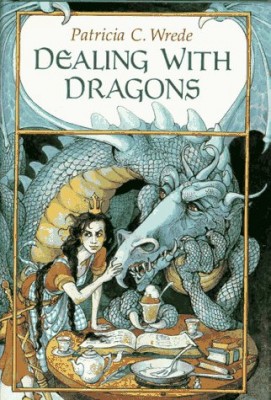Date read: 8.1.10
Book from: Personal collection
Reviewer: Emera

(Photos originally featured in New books for August last year.)
After being left with distinctly mixed feelings for China Miéville’s Un Lun Dun (review), I experienced a bout of paranoia that maybe I was just getting too old for YA books. Cue further wibbling and visions of nostalgically longing but tragically unconsummatable glances at the YA section of the library. Luckily, The Unicorn Sonata came up shortly after on my reading pile. While The Unicorn Sonata is not a great book, it is a quite good one, and – most importantly to me at the time of reading – it encapsulates the joy and sweetness that I associate with so many of the books that were childhood favorites, at the same time that there are flickers of darkness and more adult ambiguity very close to the surface.
Joey Rivera is an unhappy 13-year-old who’s most at peace when visiting her roguish abuelita in her nursing home, or cleaning and singing in the local music shop whose proprietor she’s befriended. One day, a mysterious boy named Indigo enters the shop, offering for sale a spiraled horn that plays haunting music that only he and Joey can hear. Soon after, Joey finds herself walking out of the streets of Los Angeles and into a world called Shei’rah, where she encounters a host of mythological creatures, some friendly and some dangerous – perytons, fauns, unicorns. The unicorns, Joey learns, the land’s Old Ones, are threatened by a mysterious plague of blindness. As her time in Shei’rah nears an end, she begins seeking out answers to the disease’s origins, and to the other mysteries she’s encountered in the land.
Again, none of this may be strikingly original, but all of it is written with easy grace, good humor, and exuberant imagery. The characters are well-developed for the length of the book, and their dialogue sharply written. I found Joey’s relationship with her abuelita sweet, if a little cliché, and also enjoyed the portrayal of her friendship with a lonely brook-jallah, a kind of predatory nymph. All in all, Joey’s time in Shei’rah often reminded me of the uncomplicated joy and peacefulness of scenes from the earlier Narnia books. In fact, I’m not unconvinced that there’s some deliberate referencing going on, since Joey first enters Shei’rah while walking past a streetlamp, and thereafter encounters – what else but a faun. (Though Shei’rah’s fauns are of an earthier, hairier, riper-smelling variety than Mr. Tumnus.)
I was also intrigued that the central crisis is eventually revealed to be metaphysical, rather than external, in origin, relating to the tensions running through Shei’rah’s more discontented inhabitants, but found the reveal a little too abruptly and patly delivered (“oh, and here’s the moral, by the way”) to be entirely convincing. Nonetheless, it adds another layer of complication to an already surprisingly nuanced fantasy.
Art – Robert Rodgriguez’s full-color illustrations were occasionally a little too… baroque for me (the unicorns look a little gnarly), but they certainly contribute to the book’s rich atmosphere and luxurious look, and I enjoyed his referencing of tapestry patterns in the fields and foliage.
Finally, thank you again to Vega of the Athenaeum for picking up a signed copy for me from Comic-Con!
Go to:
Peter S. Beagle: bio and review index
The Last Unicorn comic #1, by Peter S. Beagle, art by Renae de Liz and Ray Dillon (2010) E
The Last Unicorn comic #2, by Peter S. Beagle, art by Renae de Liz and Ray Dillon (2010) E
The Innkeeper’s Song, by Peter S. Beagle (1993) E

